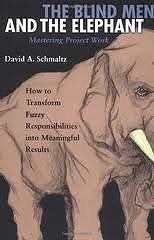ProjectManagement101

"It's a chancy job, and it makes a man watchful ... and a little lonely."
Project Management is a fundamentally fraudulent profession in that it purports to deliver something that cannot be delivered: the on-time, on-budget, and on-spec performance of a temporary, one-time enterprise. Because of this, it traditionally attracted more than its fair share of touts and bullies, those with little compunction, much self-confidence, and small appreciation for conventional definitions of what constitutes fact as well as fiction, trading almost exclusively in 'believable fiction' and arguable fact, routinely over-selling and under-delivering to the fading enthusiasm of their clients, so-called sponsors, the money-givers. Projects, too, represent as a popularly believable fiction, an enterprise lacking most of the attributes of any more conventional form of organization. I've long held that there's no such thing as a project because projects aren't things. ©2019 by David A. Schmaltz - all rights reserved
Their context seems as perfect for misconceptions as a steaming swamp might be for encouraging bacterial growth, though not all 'projects' are the same. I might better describe the dilemma by insisting that one would be hard pressed to find two projects that are very much alike, an observation that drives to distraction those insisting that projects be brought under stricter process control by adhering to one or another method, or in the lingo of projects, "methodology." (I've never understood what value the -ology adds to the term.) Still, some 'projects' seem more definitely thing-like, if not entirely things themselves. Those efforts primarily engaged in the organization of stuff in space and time more closely resemble the sorts of undertakings contemplated by classic or traditional 'project' management, the sorts of efforts more or less successfully overseen by civil engineering skills. Even these fall prey to 'things that don't qualify as things,' so-called human factors, politics, and bad luck, so even their success remains chancy, but these kinds of undertakings account for a very small percentage of 'projects' ever initiated and they materially misrepresent the challenges experienced by the more tacit majority. Managing knowledge or information as if it was stuff suspended in space and time seems to reliably yield disappointing results.
Despite the unprecedented explosion of project management professional training and certification over the last quarter century, the chances of ever serving on a 'project' administered by a "certified" Project Management Professional (PMP) —colloquially referred to as a 'pimp'—remain strikingly small, for most efforts get mustered less formally. The selection of their project manager usually depends more upon something other than demonstrated skill or extensive experience, since successful 'project' managers are hard to come by and many, once experiencing the role, steadfastly refuse to repeat the experience. Many fall prey to the standard disappointments accompanying any impossible assignment. Those who matriculated out of a profession offering more control over personal success frequently find intolerable the role's inherent constraints typified by professional success being defined by the performance of a group of people over whom the manager holds little control. Even an experienced PMP might be more likely to attempt to manage the project that's not there, deploying methods and procedures concocted for another context.
The role satisfies some, though, and not simply those who get their jollies from screaming until they turn red in the face. Satisfaction emerges from a set of non-obvious understandings almost completely unlike those guiding more commanding and controlling roles. The understanding that all promises are implicitly contingent. The understanding that misunderstandings are both likely and completely unavoidable. The understanding that standard motivators simply will not influence performance. The understanding that nobody ever sees (or really understands) the operation of the entity as a whole. These and other understandings might well be featured as the … features they are, but many, perhaps most who attempt to fill the role, never find the opportunity to either realize or disclose these differences before they erode their satisfaction and sense of self worth. As the character Matt Dillon used to say at the beginning of every episode of the radio drama Gunsmoke, "It's a chancy job, and it makes a man watchful ... and a little lonely."


